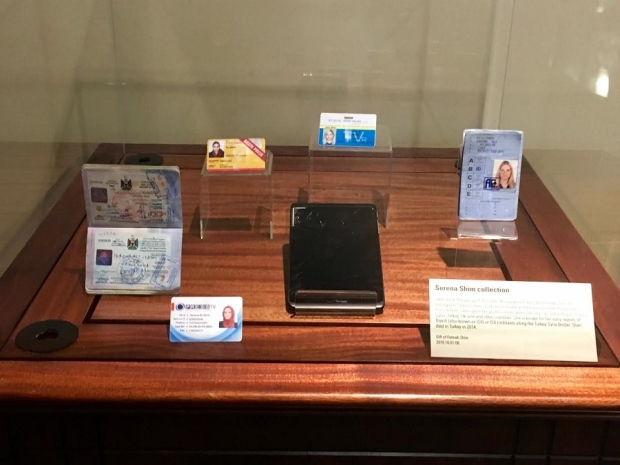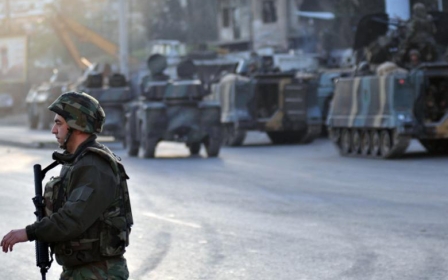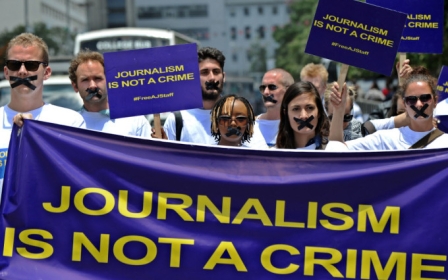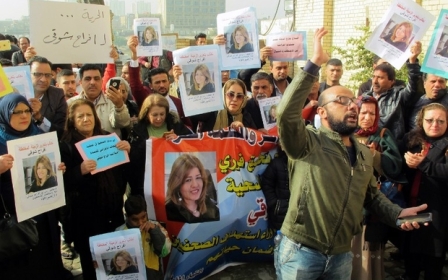From war zones to museum: The legacy of Serena Shim
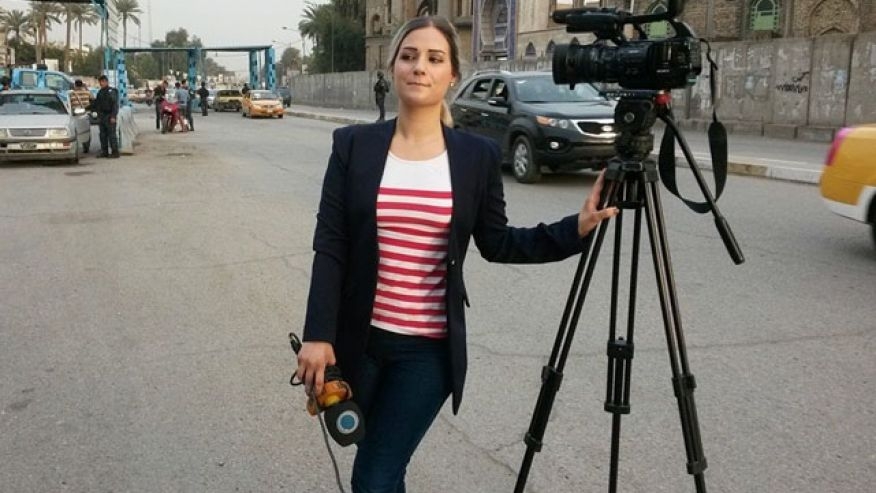
Artefacts from the celebrated career of journalist and foreign correspondent Serena Shim were recently put on display at the Arab American National Museum (AANM), a Smithsonian Institution affiliate, in Dearborn, Michigan.
Shim, who was originally from Detroit, spent her professional career overseas, broadcasting from such places as Iraq, Syria, Turkey and Ukraine.
She was most well-known for her fearless reporting on the presence of the Islamic State (IS) group and al-Qaeda-affiliated militants operating freely along the Turkey-Syria border.
“The Arab American National Museum is thrilled to accept the artefacts donated by the family of Serena Shim into our permanent collection, and to display them with other recent donations,” said Elyssa Bisoski, AANM’s curator of collections.
“The museum tells the story of Arab Americans, starting with the earliest immigrants, and Serena’s exhibit helps bring that story into the modern day.”
'I have never seen a voice that powerful'
- Farah Ali Atoui, Shim's former colleague
The glass-covered exhibit at AANM - the first and only museum in the United States devoted to Arab American history and culture - features various press ID cards that belonged to the late Lebanese-American reporter, along with her passport, driving permit and tablet.
“She is being commemorated back where she was born and raised, for the work that she did abroad,” said Shim’s mother, Judith Poe.
“To see her in a museum today speaks volumes about all that she was able to accomplish in her life.”
Shim died in October 2014 while covering a siege by IS militants on the Syrian-Kurdish border city of Kobani for Iran’s PressTV, after a car crash in southeastern Turkey. She was 29 years old.
A reporter’s life
Shim grew up in the Detroit suburbs of Dearborn and Livonia. After high school, she moved to Lebanon, settling near south Beirut in her father’s hometown of Bourj el-Barajneh.
Her drive to become a journalist was influenced, in part, by what she experienced during Israel’s military bombardment of Southern Lebanon in 2006.
“She saw that the war wasn’t being reported truthfully,” Poe said.
Posited as a strike against Hezbollah, Israel imposed a blockade on the country. More than 1,000 Lebanese civilians were killed in the Israeli offensive.
Bourj el-Barajneh was devastated by the 33-day military campaign. The Beirut suburb is home to a predominantly Shia civilian population and hosts one of Lebanon’s 12 Palestinian refugee camps.
The following year, Shim – an undergraduate at Beirut’s American University of Science and Technology at the time – was hired to host a news show for PressTV, which had launched as the first ever Iranian international news network.
Among her co-hosts was Farah Ali Atoui, who quickly became Shim’s closest friend.
At their audition, Atoui was prompted to honestly assess her competitor.
“I said: ‘I have never seen a voice that powerful,’” she recalled.
Shim went on to become a freelance correspondent at the network’s Beirut bureau, producing her own local reports and documentaries.
“It was like she knew she had something,” said Atoui. “And she wanted to actually make it grow.”
War reporting consumed the last four years of Shim’s life.
She was in Syria when the peaceful uprising began in 2011, and later went undercover inside Turkey to confront the state’s complicity in the conflict.
Shim also covered Turkey’s iconic “Gezi Park protests,” a wave of nationwide anti-government demonstrations prompting a police crackdown during the summer of 2013.
Her final months were mostly spent in Iraq, covering the country’s parliamentary elections and the Iraqi army’s fight against IS, and then in Ukraine, reporting on the armed conflict in the country’s east – with a stop in between for the Iran-P5+1 talks in Vienna – before returning to Turkey for what she envisioned to be her swan song as a foreign correspondent.
Running down the truth
It was the war in Kobani that brought Shim back to Turkey in October 2014.
“I feel like I need to go to the Turkey-Syria border ASAP,” read a text that she sent to her mother.
“I have to cover the conflict there,” she wrote.
She found herself in uncharted territory as a correspondent just six days into her new assignment after discovering that the Turkish National Intelligence Organisation (MIT) was actively inquiring about her location.
'Her achievements were great and her life should stand as an inspirational example to many'
- Congressman John Conyers
The intelligence agency had labelled her a spy and pressed locals to “give them a phone call” if they saw her.
In the interest of her welfare, Shim’s employer advised her to go public immediately and disclose the entire disconcerting affair during a live telecast.
Evoking her past reports as evidence, she ruminated on what the MIT’s interest in her might have been, citing her firsthand reportage on IS and al-Qaeda-affiliated militant groups crossing freely into Syria from the Turkish side of the Bab al-Hawa border via “World Food Organisation trucks” and other non-governmental organisation covers.
“I wonder if they think that I’m going to, you know, focus on a different area and that I’m using the umbrella of Kobani and I’m actually getting in here to do some type of investigative journalism. Because I don’t see it just being specifically in that area. And it just gives me the feeling that something is boiling and something is brewing that they think that I’m here to catch,” she said in the report.
Two days later, the rental car that Shim was riding in was involved in a car crash in Turkey’s Sanliurfa province. Her family found the circumstances of the accident suspicious and alleged foul play by Turkish authorities.
She died allegedly of heart failure a half-hour after arriving at the hospital.
Thousands thronged the streets of Bourj el-Barajneh on the day of her funeral.
“People came from all over,” said her sister, Fatmeh Shim. “Everyone was clapping and screaming: ‘The hero’s here! The hero’s here! The hero’s here!’”
The homecoming
An official inquiry into Serena Shim’s tragic death has never been issued or carried out. No verifiable autopsy report was ever conducted. Even the bare requisite of a criminal trial – allegedly scheduled to begin in March 2015 – was quashed by Turkey’s judiciary.
The family's sorrow was further burdened by the fact that the State Department did not address the death of Shim, a US citizen.
Indeed, as events across the Middle East and Turkey continue to spiral further out of control, her life’s work only grows more prescient, former colleagues and her family say.
It is for these reasons that Poe correspondingly emphasised her appreciation to AANM for recognising her daughter’s achievements within a “nonpolitical” framework.
A rare effort of outreach to the family came in the form of a condolence letter from longtime US Representative John Conyers, a Democrat and current chairman of the House Judiciary Committee.
“During Serena’s years of life she left a legacy of commitment to truth, justice and human rights. As a dedicated wife, mother, daughter, and friend, Serena lived an exceptional and honourable life,” an excerpt of the congressman’s letter reads.
“She has instilled these values in her children, and her spirit will continue to thrive through them.
“As an international journalist, a human rights reporter and war zone specialist, she touched many with her dedication towards the better good of humanity. Her achievements were great and her life should stand as an inspirational example to many.”
By preserving Shim’s story, AANM hopes to ensure that her legacy will live on to inspire future generations to come.
New MEE newsletter: Jerusalem Dispatch
Sign up to get the latest insights and analysis on Israel-Palestine, alongside Turkey Unpacked and other MEE newsletters
Middle East Eye delivers independent and unrivalled coverage and analysis of the Middle East, North Africa and beyond. To learn more about republishing this content and the associated fees, please fill out this form. More about MEE can be found here.


